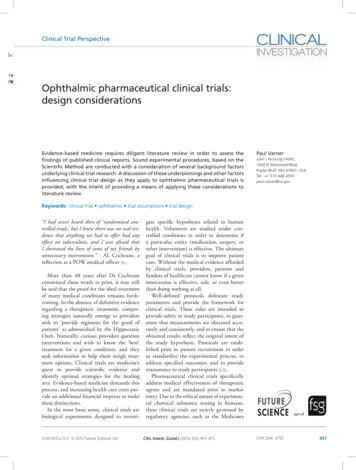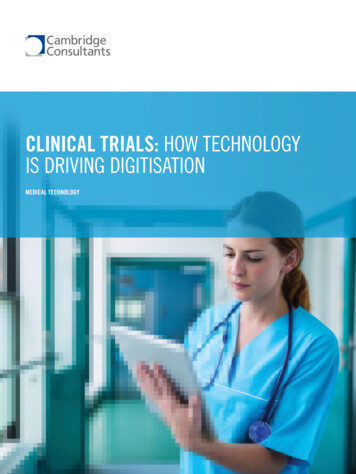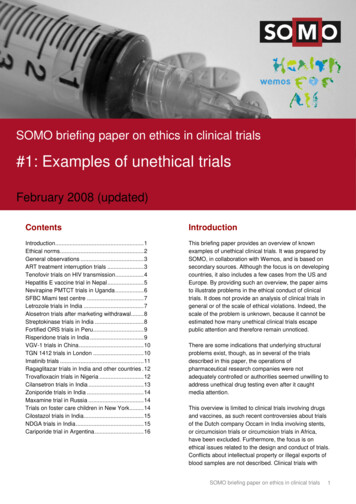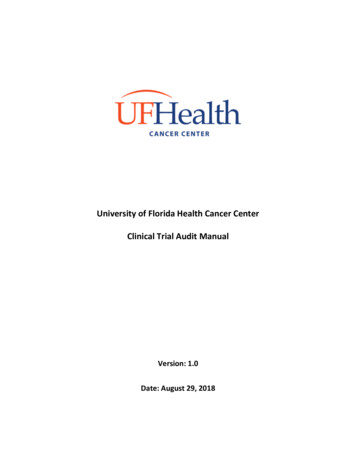
Transcription
March 13, 2014 ThursdayToday’s Intelligence at a Glance1. Market Overview: Neoadjuvant Breast Cancer a FastPath to Market for Puma’s Neratinib, But Need toImprove on Perjeta; Synta’s Ganetespib NeoadjuvantStudy May Be PrematureStifel/Sendek, March 12, 2014HealthACE AbstractUUIndication: BreastAdditional AnalysisPhase III Trials for NeratinibStudy NameIndicationEndptsCompletion DateNCT00878709Breast Cancer1º: DFSNovember 2013ExteNET(Previously DiagnosedHER2 ; After AdjuvantTreatment withTrastuzumab)2º: TTDR, DFSDCIS, DistantDFS, OS, SafetyNCT01808573Breast Cancer1º: OS, PFSNALA; WithCapecitabine; Vs.Lapatinib &Capecitabine(HER2 Metastatic;(IndependentlyReceived 2 Prior HER2 assessed); 2º:Directed Regimens)PFS (Investigatorassessed, ORR,CBR, DOR,Adverse events2. Tesaro: Enters Broad Collaboration with AnaptysBio,Gaining Multiple Immuno-Oncology AssetsBMO Capital Markets/Birchenough, March 13, 2014HealthACE AbstractIndication: MultipleUU3. Oncothyreon: Brain Metastases from mBC aCompelling Opportunity for ARRY-380; Two Phase ICombo Studies with Xeloda and Kadcyla UnderwayStifel/Sendek, March 12, 2014HealthACE AbstractUUIndication: Brain4. Gilead: NEJM Editorial Suggests Idelalisib inCombination with Pharmacyclics’ Ibrutinib; FocusRemains on Advancing a PI3K/Syk Combo into EarlierLines of TherapyWells Fargo Securities/Abrahams, March 13, 2014HealthACE AbstractIndication: HematologicUEstimatedDesignCBR: Clinical Benefit RateDFS: Disease-Free SurvivalDCIS: Ductal Carcinoma in SituDOR: Duration of ResponseOS: Overall SurvivalORR: Objective Response RatePFS: Progression-Free SurvivalTTDR: Time to Distant RecurrenceCompletedMay 2018RecruitingSource: www.clinicaltrials.govUSelected Clinical Trials for Synta's Ganetespib (STA-9090)5. Genmab: Partner Janssen Set to Initiate First Phase IIITrial of Daratumumab (MM); Could Receive AcceleratedApproval for Salvage MM with Phase II DataJefferies/Welford, March 12, 2014HealthACE AbstractUUIndication: Hematologic6. Innate Pharma: Lirilumab (Phase II/AML) Passed2nd Safety Assessment; Enrollment is Expected toComplete in Mid-2014JPMorgan/Chesney, March 12, 2014HealthACE AbstractUUGoldman Sachs/Flynn, March 11, 2014HealthACE AbstractIndication: HematologicU8. Celgene: Markman Hearing Scheduled for Late-April;Settlement Likely After Hearing and Would Be ViewedFavorablyBarclays Capital/Huang, March 12, 2014HealthACE AbstractIndication: HematologicUUIndicationAdvanced NSCLCPhase III; GALAXY; DocetaxelNCT01798485Advanced NSCLCPhase III; GALAXY 2; /-DocetaxelIndication: Hematologic7. Agios Pharmaceuticals: First Phase I Data of AG-221(AML) at AACR Suggests Initial Signal of Activity;Could De-Risk Cancer PlatformUStudy NameDesignNCT01348126NCT01677455Phase IINCT01562015Phase II; CHIARABreast Cancer(HER2 or TripleNegative)NSCLC(ALK )DCR: Disease Control RateNSCLC: Non-Small Cell Lung CancerORR: Objective Response RateOS: Overall SurvivalPFS: Progression-Free SurvivalEstimatedEndptsCompletion Date1º: PFSMarch 20142º: ORR, OS,DCR, Tumor sizechange,Toxicities, Qualityof lifeOngoing1º: OSApril 20152º: PFS, ORR,DCR, Duration oftreatment andresponse,SymptomimprovemnetRecruiting1º: ORROctober 20132º: PFS, Durationof responseRecruiting1º: ORRSeptember 20152º: Duration ofresponse, DCR,PFS, OS,RecruitingAdverse eventsSource: www.clinicaltrials.gov
UBack to Front PageMarket Overview: Neoadjuvant Breast Cancer a Fast Path to Market for Puma’s Neratinib, But Need to Improveon Perjeta; Synta’s Ganetespib Neoadjuvant Study May Be PrematureFront-line standard of care for MBC will likely include Kadcyla and/or Perjeta. Our physician consultant expectsKadcyla and Perjeta to become integrated into the current front-line standard of care, Herceptin. He sees the results fromthe front-line MARIANNE trial, comparing 1) Herceptin Taxol to 2) Kadcyla monotherapy and 3) Kadcyla Perjeta, assetting the new Her2-positive standard of care going forward. We expect interim data before the end of 2014. He viewsthe ARRY-380 Kadcyla trial as a relevant combination.High bar for neratinib in adjuvant MBC. In the adjuvant setting, our doc believes that neratinib would need a 93%98% disease-free survival at the 3-year interim analysis to be considered a success. Regardless of the outcome, our docexpects positive results from the ALTTO study (1 year of Herceptin vs. 1 year of Herceptin Tykerb) and APHINITYstudy (1 year of Herceptin vs. 1 year of Herceptin Perjeta), and therefore does not see a 1 year Herceptin 1 yearneratinib regimen being the long-term preferred regimen, given the other possible next-generation combinations.Neoadjuvant a fast path to market for neratinib, but may need to improve on Perjeta. Our doc sees an opportunityfor neratinib in the neoadjuvant setting, but notes that neratinib would likely need a new trial with Perjeta and Kadcyla toshow a clinical impact. We see neoadjuvant as the quickest route to approval in a novel combination, as a new trial couldutilize pathological complete response (pCR) as an endpoint, which reads out after treatment, rather than DFS or othersurvival metrics, which require long-term follow-up.HER2-mutated breast cancer may offer more than a niche opportunity. Our doc noted that neratinib showed a strongsignal in Her2-negative Her2-mutated breast cancer and stated that the incidence of 1%-2% of total breast cancer patientsstill translates to a greater incidence than many smaller cancers due to the high incidence of breast cancer overall.Ganetespib neoadjuvant study may be premature. Our physician consultant views Hsp90 inhibition as aninteresting treatment modality but thinks Ganetespib inclusion in I-SPY2 is premature. He stated that early data onGanetespib looks interesting and as a target Hsp90 could be a compelling mechanism for inhibition. However he notedthat development of Ganetespib in breast cancer remains early and has not yet demonstrated conclusive evidence ofefficacy in advanced breast cancer. In his opinion, drug undergoing development in breast cancer need to earn credibilityin later lines of disease prior to moving forward into the adjuvant or neo adjuvant setting. Given a convincing dataset forGanetespib in advanced disease, our consultant indicated that inclusion of this compound in the I-SPY2 trial is prematureand not likely to achieve success.Source: Stifel/Sendek, March 12, 2014Oncology Indication: BreastKeyword: Market Overview
UBack to Front PageTesaro: Enters Broad Collaboration with AnaptysBio, Gaining Multiple Immuno-Oncology AssetsTesaro (TSRO) and AnaptysBio announced a broad collaboration and exclusive worldwide license agreement for multipleimmuno-oncology assets. These include antibodies to TIM-3, LAG-3, PD-1 as well as dual PD-1/TIM-3 and PD- 1/LAG3 inhibitors. TSRO also announced that clinical trials of TSR-042 (anti PD-1) will begin in mid-2015, while clinicalcandidates for TIM-3 and LAG-3 will be selected in Q2/14 and Q3/14 respectively.The development of immune-checkpoint (IC) inhibitors is expected to change the treatment landscape of cancer and is afield that has been led by large pharma. Today's announcement arguably puts TSRO at the head of the biotech fieldin immune-checkpoint (IC) research.While the PD/PD1 field is highly competitive and arguably TSRO's anti PD1 may be late, the next wave of innovation inIC inhibition will come from combination IC therapy as durable responses to PD/PD1 occur in a minority of subjects andcures are few and far between.TSRO's strategy has been to address unmet needs for current therapeutics, thus TSR-011 (ALK inhibitor) will be tested inpatients failing both first- and second-line TKI's. Following in the same theme, combinations of PD-1 inhibition withother IC inhibitors, or non IC targets such as ALK or PARP would be expected to improve outcomes over ICmonotherapy alone in appropriately selected patients. We are optimistic that TSRO will identify a differentiateddevelopment path to establish a competitive Immuno-Oncology franchise.Source: BMO Capital Markets/Birchenough, March 13, 2014Oncology Indication: MultipleKeyword: Partnerships/Business Developments
UBack to Front PageOncothyreon: Brain Metastases from mBC a Compelling Opportunity for ARRY-380; Two Phase I Combo Studieswith Xeloda and Kadcyla UnderwayOur recent conversation with a breast cancer physician consultant identified CNS metastases from MBC as an opportunityfor ARRY-380 use in the clinic. We add brain mets to our Oncothyreon (ONTY) model and estimate 47M of 2022 salesfor this indication.We see brain mets from MBC as an underserved indication as there is currently no approved drug for its treatment. Ourphysician consultant noted that 50% of Her2-positive MBC patients from the HERA trial developed brain mets at the 8year follow-up. We estimate that 5% of the total MBC population will eventually develop brain mets and see a potentialmarket opportunity of greater than 2500 new patients in 2022.The brain mets opportunity is compelling for ARRY-380 as in preclinical studies, ARRY-380 had superior efficacyagainst brain metastases compared to Tykerb or neratinib. Our physician consultant also saw ARRY-380’s specificityfor Her2 to the exclusion of EGFR leading to a more benign side effect profile than either Tykerb or neratinib. He notedthat compared to neratinib, which had 30% grade 3/4 diarrhea in early testing without prophylaxis, ARRY-380 had acleaner profile. We estimate approval in 2019 with immediate brain met usage.ONTY recently initiated 2 Phase I trials for MBC in combination with Xeloda and in combination with Kadcyla.Our physician consultant sees the Kadcyla combination specifically as a relevant combination in light of the shiftingparadigm of treatment that will likely include Kadcyla and/or Perjeta. We see upside to these trials as they are enrollingpatients with brain mets, leveraging a possible niche role that ARRY-380 could play. We see the initiation of these trialsas reducing the risk in the development of ARRY-380 and lower our discount rate to 20% from 25%.Source: Stifel/Sendek, March 12, 2014Oncology Indication: BrainKeyword: Clinical Trials/Pipeline
UBack to Front PageGilead: NEJM Editorial Suggests Idelalisib in Combination with Pharmacyclics’ Ibrutinib; Focus Remains onAdvancing a PI3K/Syk Combo into Earlier Lines of TherapyYesterday (3/12), the NEJM published the results of two studies of Gilead’s idelalisib: (1) The '116 phase III study ofrituximab /idelalisib, which was stopped at an interim analysis due to significant PFS and OS benefits and subsequentlyled to FDA granting BTT designation in R/R CLL; and (2) The DELTA phase II study in dual-refractory iNHL foridelalisib monotherapy, which demonstrated a 57% ORR with median PFS of 11 months.While the data has been previously released, the articles were accompanied by a new editorial from two thought leaders inoncology, Dr. David Furman and Lewis Cantley. Interestingly, the physicians suggested a combination of idelalisib andPharmacyclics’ Btk inhibitor ibrutinib could help suppress clonal mutations in the PI3K delta isoform or BTK that couldhelp treat a portion of the patients seen without durable response.While the authors' editorial may have clinical and scientific merit, Gilead is focused on advancing a PI3K/Syk combo intoearlier lines of therapy where we believe a Syk inhibitor could have similar complimentary/synergistic effects when usedin a combo. Pharmacyclics/Janssen have initiated a number of combination studies in 1L and R/R B-cell malignancies. Inthe coming years we expect the number of novel/novel combinations to increase in a variety of blood cancers.Overall, we continue to view the NHL and CLL markets as sufficiently large to support multiple novel new oral agentseither as monotherapy or in combinations. We remain positive on both Gilead and Pharmacyclics.Source: Wells Fargo Securities/Abrahams, March 13, 2014Oncology Indication: HematologicKeyword: Clinical Trials/Pipeline
UBack to Front PageGenmab: Partner Janssen Set to Initiate First Phase III Trial of Daratumumab (MM); Could Receive AcceleratedApproval for Salvage MM with Phase II DataDaratumumab (dara) is gearing-up: Confirmation partner Janssen will initiate the first formal Phase III dara study in2Q14E underscores our confidence in the product's rapid and broad development, plus the timeline advantage vs.competing anti-CD38s. Hence we hike our probability to 60% from 45%, maintaining still potentially modest 2.5bn WWpeak sales. Initial Phase I/II efficacy with dara in combo with Revlimid/dex are impressive, in our view, with notolerability concerns and rapid responses. Clinicians' enthusiasm for anti-CD38 therapies in MM is palpable, withGenmab/Janssen's dara the most advanced of three antibodies.Path to sustainable future: We believe DKK2.5bn (c. 470m) Net Cash after the January share placing is more thansufficient to reach meaningful profitability around 2016E. Importantly by this time we believe daratumumab could receiveaccelerated approval for salvage MM, with Phase II data and the FDA Breakthrough Therapy Designation, and we alsoforecast Arzerra royalties to fund underlying OpEx, assuming management's spending remains constrained. Arzerra saleswith partner GSK could ramp-up late-2014E on 1st-line CLL approvals and headline CLL/DLBCL Phase III results bymid-14E. Roche's competing Gazyva is generally perceived to be more potent, but we believe this is exaggerated, andwhile novel orals ibrutinib and idelalisib will likely disrupt the market we see anti-CD20 therapies remaining a backbone.Genmab's clear commitment to signing new collaborations with the three antibody tech platforms, plus potentially ADCs,could also provide future upside.Source: Jefferies/Welford, March 12, 2014Oncology Indication: HematologicKeyword: Clinical Trials/Pipeline
UBack to Front PageInnate Pharma: Lirilumab (Phase II/AML) Passed 2nd Safety Assessment; Enrollment is Expected to Complete inMid-2014Innate Pharma has announced that the Data and Safety Monitoring Board (DSMB) has completed its second assessment ofthe EffiKIR trial of lirilumab in AML (a form of blood cancer) and recommended continuation of the trial. The aim of the2nd interim analysis is mainly for safety and we view the recommendation from DSMB as a positive endorsementof lirilumab’s safety profile. We expect enrollment of the EffiKIR trial to complete in mid-2014.Unmet medical needs in this indication are high, especially elderly AML patients in remission. We model a 1 bn peak inmarket sales of lirilumab in AML, and believe the EffiKIR study is likely to report final survival data in 2H15 after thetrial continuation recommendation from DSMB. If positive, the results may be used for regulatory filings and lead to anapproval decision by late 2016.Lirilumab is also currently being investigated in Phase I solid-tumor trials in combination with two immune check pointantibodies from Bristol-Myers, nivolumab (anti-PD1) and Yervoy (anti-CTLA4). The combined peak sales opportunityfor solid tumors is c. 7 bn on our estimates and we are likely see initial response data in 2H14.Source: JPMorgan/Chesney, March 12, 2014Oncology Indication: HematologicKeyword: Clinical Trials/Pipeline
UBack to Front PageAgios Pharmaceuticals: First Phase I Data of AG-221 (AML) at AACR Suggests Initial Signal of Activity; CouldDe-Risk Cancer PlatformIn our view the most important takeaway from Agios’ 4Q call is that the company plans to present the first Phase 1 datafor its lead cancer drug, AG-221, at the AACR conference (April 6), which is well ahead of prior guidance of ASHconference in December.While management declined to comment on specifics of the ‘221 data, the acceleration of the presentation timelines andthe acceptance of the data for presentation at AACR likely indicate an initial signal of activity of the drug in our view.Management also noted that dose escalation in the ‘221 trial is continuing, which we view as a positive for short-termsafety/tolerability of the drug.We are raising our probability of success for both AG-221/AG-120 to 40% from 25%/15% on our expectation of data inApril that should being to de-risk ‘221 and Agios’ platform targeting the IDH pathway for cancer (which includes itssecond drug ‘120).For reference, isocitrate dehydrogenases (IDHs) are enzymes involved in cellular metabolism. Mutated IDH enzymes arefound in number of cancers including acute myeloid leukemia (AML, type of blood cancer) and brain cancer. Agiosdiscovered that the mutant IDH enzymes adopted gain-of-function activity that allows the mutant IDH to produce largeamounts of a metabolite called 2–hydroxygluturate (2-HG). There is a growing body of evidence that suggests 2-HGdrives cancer growth and survival. AGIO has developed compounds that inhibit mutant IDH and as a result reduce thelevels of 2-HG. We note that ‘221 targets IDH2, which is more common in blood cancers such as AML, while ‘120targets IDH1 that is more prevalent in solid tumors (Exhibit 1).Source: Goldman Sachs/Flynn, March 11, 2014Oncology Indication: HematologicKeyword: Clinical Trials/Pipeline
UBack to Front PageCelgene: Markman Hearing Scheduled for Late-April; Settlement Likely After Hearing and Would Be ViewedFavorablyThe Markman hearing for the Celgene vs. Actavis patent litigation case for Revlimid has been scheduled for April 29th,2014 in Newark in front of Judge Susan D. Wigenton. This is earlier than expected as the Street was largely expecting ahearing in the second half of the year.Based on discussions at the Barclays conference, we believe there is a greater possibility that Celgene will eventuallysettle with Actavis. In our view, a settlement that provides Actavis with a short period of exclusivity will actually beviewed as a positive by investors as the Markman hearing has been an overhang on Celgene shares. We expect Celgene toreview the findings of the Markman hearing and decide whether to proceed to trial or settle closely following the hearing.Source: Barclays Capital/Huang, March 12, 2014Oncology Indication: HematologicKeyword: Policy/Legal
The brain mets opportunity is compelling for ARRY-380 as in preclinical studies, ARRY-380 had superior efficacy against brain metastases compared to Tykerb or neratinib. Our physician consultant also saw ARRY-380's specificity for Her2 to the exclusion of EGFR leading to a more benign side effect profile than either Tykerb or neratinib. He noted











